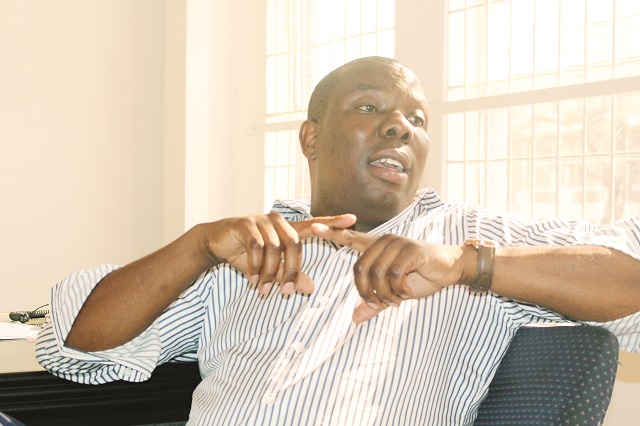AG report exposes councils corruption

Innocent Ruwende
As has become the norm corruption and the failure by most councils to address the same old problems of water and poor roads headlined the year 2016 with little hope that much will change in the coming year.
Auditor-General (AG) Ms Mildred Chiri’s report on local authorities for 2015, exposed corruption in most councils.
The report showed that Harare could have been fleeced of millions of dollars following revelations that two anonymous computers were being used to bill customers each month amid the likelihood that more funds were looted through the fraudulent issuance of receipts.
According to the report which exposed corruption in most councils, the city’s IT department failed to detect the computers that were being used to generate the bills.
“Therefore, there is room for the employees to create fake receipts that can be used to receipt customers when they settle their monthly bills,” reads the report.
The same report shows that Gweru City Council failed to account for a more than $1 million loan balance and the city’s mayor and town clerk had no fuel limit while council’s senior employees were being paid holiday and education allowances outside the payroll.
The audit showed that Mutare City Council had a bank overdraft facility with FBC Bank of $4 162 154 as at December 31, 2013, for which the city paid $1 215 349 as interest and service charges.
The audit also revealed that most councils were not up-to-date with their audited financial statements and a majority of councils maintain multiple bank accounts whose reconciliations were not up to date.
In some cases, the bank balances did not reconcile to the cash book balances resulting in unexplained variances.
The report also showed that The Ruwa Local Board has been flouting tender procedures and acquired vehicles worth more than $200 000 without going to tender, amid fears that the local authority might have been swindled of thousands of dollars in various tender scams.
According to Ms Chiri the board also entered into a contract to buy fuel from Power Fuels without following tender procedures.
The board bought a Nissan Navara for $36 000, two Junbei minibuses for $129 900 and a Hover truck for $38 000.
Ms Chiri said as a result, there was a risk of financial loss due to procuring at more than competitive prices hence the board was urged to adhere to tender procedures to ensure transparency and realise value for money in the awarding of tenders.
In Kwekwe among other irregularities, the audit found out that the council’s bank reconciliation statement had an unexplained reconciling figure of $2 569 043 which could not be traced to any underlying transactions and there was a risk that the unreconciled balances may have been used to conceal irregular activities.
In Kariba, the AG was unable to confirm the accuracy, completeness and validity of receivables written off totalling $1 103 543 as council could not provide documentation that supports the write-off of debts.
In Redcliff an analysis of residential stand files showed that most of the agreements of sale were not signed and they seemed to have been prepared post allocation and terms of agreement varied depending on the initial deposits made, some of which were as low as $5.
The audit also revealed that the council’s CBZ Bank account was in overdraft with an amount of $400 000 and municipality was unable to service it as the loan interest continued to rise.
In Norton the audit showed that the council had total employment costs of $3 108 321 out of expenditure of $5 022 069 indicating that employment costs constituted 62 percent in violation of the ministerial directive prescribing a ratio of 30:70 in favour of service delivery.
The AG said the audit findings warrant the attention of management and those charged with governance.
A tender scam was also unearthed in Harare after council awarded a $13,8 million tender for the rehabilitation of Firle Sewer Works to an unregistered company with no capacity to carry out the work.
Council awarded the contract to a local company, Energy Resources Africa Consortium (ERAC), which was not formally registered and has been paying the firm millions of dollars since 2011, although the two parties did not have a contract.
The company has so far been paid over $5 million. The city set up a seven-member team to probe the deal, valued at $13,8 million, which was supposed to start in April 2011 and end in October last year.
The team comprised four councillors and three external experts — an engineer, a lawyer and an accountant.
In Bulawayo, the deputy mayor of Bulawayo, Councillor Gift Banda, and four other councillors were suspended by the Minister of Local Government, Public Works and National Housing, Cde Saviour Kasukuwere, over a raft of allegations involving underhand dealings and rampant corruption.
In a move aimed at weeding out the rot within the Bulawayo City Council, Cde Kasukuwere suspended Clr Banda together with Clrs Charles Moyo (Ward 9), Mzama Dube (Ward 25), Reuben Matengu (Ward 21) and James Sithole (Ward 7) during a meeting he held with city fathers in council chambers.
The suspensions came in the wake of revelations that the local authority is owed more than $500 000 in illegal land deals involving councillors who have been accumulating vast tracts of land at the expense of the people.
In Mutare a Government’s probe into the operations of Mutare City Council opened a can of worms, with the special audit report showing that over $3 million collected revenue was not banked into the city’s accounts and that the city has 11 accounts which were overdrawn by more than $2 million, among many acts of financial mismanagement.
The audit also showed that while council workers have gone for 18 months without salaries, town clerk Mr Obert Muzawazi claimed over $30 000 school fees for his children, including one who is attending a university in the United Kingdom, which cost ratepayers £7 000 annually. Following the disclosure the under-pressure Mr Muzawazi resigned.
Minister Kasukuwere had to intervene following reports that some councillors were sitting in interview panels for junior staff. The Minister urged councillors to desist from corrupt activities and stop sitting on interview panels for junior staff.
Harare City’s controversial appointment of former banker Mr James Mushore also made headlines.
Mr Mushore wrote a piece of history for himself by becoming the shortest serving Harare town clerk after he was appointed and fired the same day.
Government rescinded the appointment of Mr Mushore to the post of town clerk just a few hours after council announced his appointment because the local authority flouted procedures of appointment as laid out in the Urban Councils Act.
According to the law, council was supposed to submit three candidates to the Local Government Board for approval.
Minister Kasukuwere told council that the former banker’s appointment was illegal.
Council was forced to send Mr Mushore on indefinite forced leave and since then Mrs Josephine Ncube has been acting town clerk.
Several cases were then instituted before the courts and two of them are still pending Minister Kasukuwere ordered council to appoint a substantive town clerk and fill all the vacant posts to ensure smooth operations at town house during his council visit but the city has been dragging its feet saying it is bound by the court applications.
Mr Mushore recently wrote to council demanding over $70 000 in salaries and benefits.
According to the contract signed by Mr Mushore in April, he was entitled to $10 475 monthly salary.
It was not all negative for Harare as its Geographic Information System (GIS) has made some positive strides after managing to capture almost 80 000 houses which were not contributing to revenue.
Some property owners have not been seeking certificates of occupation after completion of the construction of their buildings from the city, a process that would result in them being registered on the rates database, and subsequently on the billing system.
Instead, they prefer to use private water meter installers.
The non-registration has resulted in the 80 000 properties accessing water and other services for free.
City of Harare embarked on the GIS programme in 2014 with the help of its sister cities of Munich (Germany), eThekwini (South Africa) and City of Bulawayo under a project titled ZIGESA which stands for Zimbabwe Germany and South Africa.
Harare for the first time in 15 years presented its audited statements in time with Mayor Bernard Manyenyeni calling on council management to exhibit more energy and pace and bury the culture of delinquency.
Mayor Manyenyeni said it was a great milestone for the city to present audit reports for the 2015 financial year
Generally, all towns and cities continued to struggle to provide basic services and un-trafficable roads continue to trouble motorists with local authorities accusing Zinara of giving them little resources leading to the deplorable state of the road network in most towns and cities.
Residents’ debts also continue to balloon with Harare alone being owed more than $550 million.
Water woes continued to bedevil Chitungwiza with the municipality saying it did not have an immediate solution to deal with the current water woes.











Comments